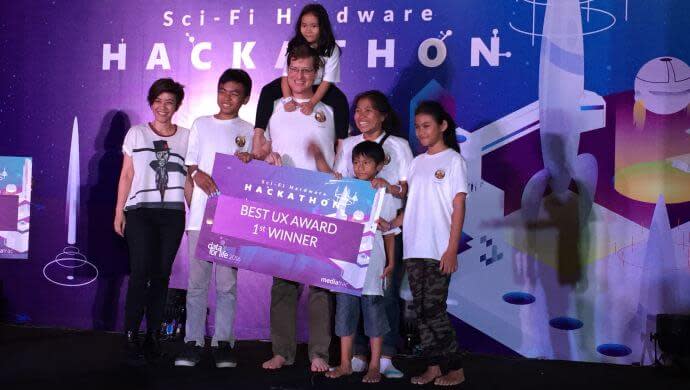Smart floating dome, zombie detector take home prizes at Sci-Fi Hardware Hackathon 2016
As a part of the Data for Life 2016 event, the hackathon took in 324 participants with the youngest being five-year-old
Team MANTIS posed with Mediatrac CEO Regi Wahyu (second from right)
The Sci-Fi Hardware Hackathon (SFHH), a 2-day-event marking the beginning of the mega Big Data event Data for Life 2016, drew to a close, with Team MANTIS winning the top prize.
Team MANTIS won the hackathon for its proposal of a “smart floating dome” that can anticipate the rising sea level, which poses huge threat to Indonesia, the world’s largest archipelago.
It competed with a total of 324 participants and 62 teams to emerge as the winner.
In this event, participants were encouraged to take inspirations from various science fiction films. Team MANTIS took inspiration from the Gundam series to propose its idea.
The floating dome utilises Big Data to closely monitor sea level. According to the team, this technology can also be used to issue warnings to people living in the coastal areas about possible dangers emanating from the seas.
Also Read: IRAS is next Singapore government agency to launch a hackathon
MANTIS received a cash prize of IDR15 million (US$1,100) and premium membership in Indonesia’s leading digital forum Kaskus.id.
“After the announcement, I asked Team MANTIS to come to my office. In July [2017], they will be leaving for India to attend an innovation centre, a hackathon being organised in partnership with MIT Media Labs and is led by Anthony Vipin Das. I’m going to mentor them personally,” said Mediatrac CEO Regi Wahyu, who was a member of the judging panel.
“There is also another exciting opportunity for them which I am not able to disclose just yet. It turns out that their futuristic tech can be applied today,” he said. “One executive director of a particular institution is looking for a solution for Indonesia’s waters issues. I called him and the Team MANTIS presented their idea to him. They are going to hold another meeting tonight,” he told the press post the event.
SFHH is a collaboration among Mediatrac, Makedonia and Data Science Indonesia.
Plants versus zombies
According to a Mediatrac spokesperson, the competition received up to 600 applicants with various background, from computer programmers to fashion designers. The competition also hosted competitors from a varied age groups, with the oldest being 35 years old and the youngest five years old.
A group of elementary school students, called Sparky’s Homeschool, emerged winner in the Best Design & UX category.

Sparky’s Homeschool team won the Best Design & UX category
Also Read: Joint Israel-India, four-city hackathon to tackle health in rural India
With science fiction films as a source of inspiration, it is no wonder that many of the finalists came up with fantastic ideas to solve various problems faced by the people.
IG-2-T team took home two prizes as the runner-up for the Best Design & UX and Best Concept categories with their ‘zombie detector’ idea — inspired by the television show Walking Dead and various zombie series. It is a wearable device that can eventually be developed as an implant. It can detect and alert citizens of the existence of zombie groups among healthy human beings.
Some of the finalists also presented ideas related to agriculture. One of the finalists KMD Mikro built iKOW (Integrated Kettle Operation Ware) a data-driven kettle farming system that can detect changes in the environmental condition inside a barn like temperature, and will trigger the facility to react accordingly.
Also Read: Teacher’s help: Google Indonesia announces 5 hackathon winners that will rock the way we study
There is also Daun, an idea that uses augmented reality to visualise agricultural data. Farmers will only have to wear a device similar to Google Glass, and the system will enable plants to ‘talk’ and communicate their condition to farmers.
“In the past two days, I have seen many innovations related to nature, agriculture, farming, and maritime which are part of our identity as Indonesians. This is why I kept on stressing the importance for us to be independent in our mind and innovate for our own needs and even to the world,” Wahyu closed.
The post Smart floating dome, zombie detector take home prizes at Sci-Fi Hardware Hackathon 2016 appeared first on e27.



